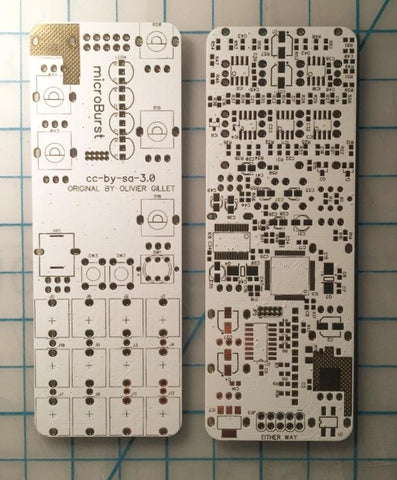µBurst - PCB
An 8hp reinvention of the Mutable Instruments - Clouds module. Developed by Jim with Neutron Sound this is a smaller more space efficient layout of the classic Mutable Instruments - Clouds.
PCB comes in ENIG gold-plated finish on white for that LA nightclub feeling.

This is Open Source Project
Want to contribute? This project could benefit from your input. Contact us if you are interested.
We are a small 2 person shop and unfortunately do not have time to be able to offer any build support or answer all your questions about troubleshooting your DIY builds, but do our best to reply in a timely manner and point you in the right direction. For the most part you can safely consider this identical to a regular Clouds
If you really want one of these and don’t have the DIY chops to build your own we recommend you join our FACEBOOK GROUP and find a builder who is making these to order. There is a great community of savvy builders sharing information here from all over the globe. Also, join the conversation with Magpie on Muffwiggler.
Mutable Instruments Resource Sheet
Original CAD file, PCB & Schematic and original design elements provided by Mutable Instruments under creative commons CC-BY-SA-3.0 license.
DipTrace
Our design contributions are provided by Magpie Modular under Creative Commons CC-BY-SA-3.0 license.
Please be advised: This board is 0603 SMT components and thus not suitable for beginners. If you would like a good introduction to the sDIY world we recommend a simpler through-hole kit such as the Mikrophonie and working up in complexity from there.
Before purchasing be ensure you are comfortable with setting up the development environment needed to compile the firmware and flash these units and understand the basic flow of working on microprocessor based builds. That said: The point of providing these boards is that learning to work SMT is not an insurmountable task and with proper research, practice and steady hands you might actually prefer it. (or not)
If you are interested in a simple SMT build in which to start we recommend something analog with a small part count, such as a Links or Shades. Working up from there Branches is a nice easy introduction into microprocessors and then I find all the others about the same.
Resources:
EEV Blog Surface Mount Soldering Tutorial [1] [2] [3]
ControlLeo2 - Simple Reflow Oven


